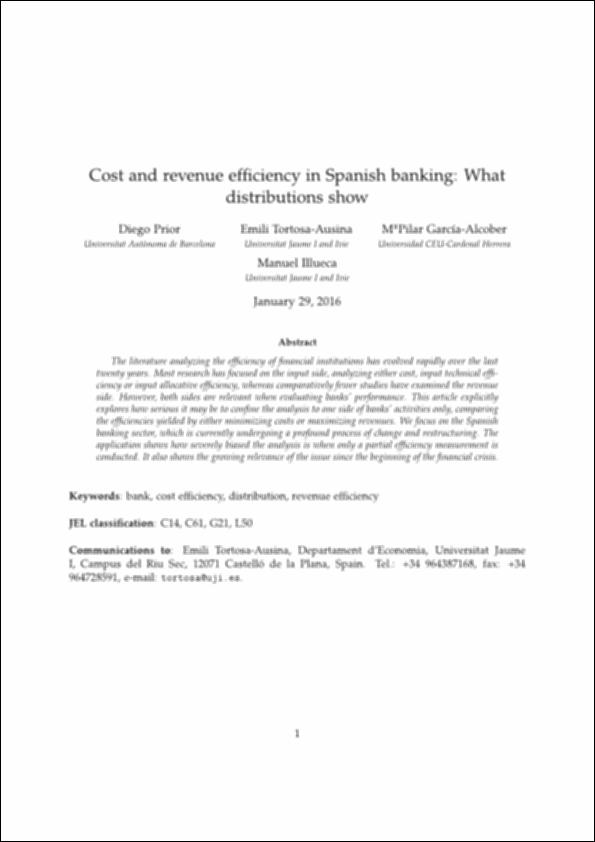Please use this identifier to cite or link to this item:
http://hdl.handle.net/10637/14756Cost and revenue efficiency in Spanish banking: What distributions show
| Title: | Cost and revenue efficiency in Spanish banking: What distributions show |
| Other Titles: | Costes, ingresos y eficiencia en la industria bancaria española: un análisis comparativo de los años de crisis y pre-crisis |
| Authors : | Prior Jiménez, Diego Tortosa Ausina, Emili García Alcober, María Pilar Illueca Muñoz, Manuel |
| Keywords: | Banks; Banco; Análisis costes-eficiencia; Cost effectiveness |
| Publisher: | Informa UK Asociación Española de Contabilidad y Administración de Empresas (AECA) |
| Citation: | Prior, D., Tortosa-Ausina, E., García-Alcober, M.P. & Illueca, M. (2016). Costs, revenues and performance in Spanish banking: a comparative analysis of pre- and early crisis years. Spanish Journal of Finance and Accounting / Revista Española de Financiación y Contabilidad, vol. 45, i. 3, pp. 345-364. DOI: http://dx.doi.org/10.1080/02102412.2016.1193971 |
| Abstract: | The literature analysing the efficiency of financial institutions has evolved rapidly over the last 20 years. Most research has focused on the input side, analysing either cost, input technical efficiency or input allocative efficiency, whereas comparatively fewer studies have examined the revenue side. However, both sides are relevant when evaluating banks’ performance. This article explicitly explores how serious it may be to confine the analysis to one side of banks’ activities only, comparing the efficiencies yielded by either minimising costs or maximising revenues. We focus on the Spanish banking sector, which is currently undergoing a profound process of change and restructuring. The application shows how severely biased the analysis is when only a partial efficiency measurement is conducted. It also shows the growing relevance of the issue since the beginning of the financial crisis. © 2016 Asociación Española de Contabilidad y Administración de Empresas (AECA). La literatura que se ha venido ocupando de analizar la eficiencia de las instituciones financieras ha evolucionado rápidamente durante los últimos 20 años. Muchas investigaciones se han centrado en la vertiente de los inputs, ya sea analizando la eficiencia en costes, la eficiencia técnica o la asignativa mientras que, en proporción, el número de estudios analizando la vertiente de los ingresos ha sido mucho menor. Sin embargo, ambas partes son relevantes al evaluar la eficiencia de las institituciones financieras. En este estudio se explora de forma explícita la relevancia de limitar el análisis a una única vertiente de la actividad de las empresas bancarias, comparando la eficiencia en costes frente a la eficiencia en ingresos. El análisis se centra en la industria bancaria española, actualmente sometido a un profundo proceso de cambio y reestructuración. Los resultados corroboran que, efectivamente, se incurre en un sesgo importante al limitar el análisis a una única vertiente (ya sean los costes o los beneficios) y que, por otra, la cuestión ha adquirido una mayor importancia desde el inicio de la crisis financiera. |
| Description: | This is an original manuscript of an article published by Taylor & Francis in Spanish Journal of Finance and Accounting / Revista Española de Financiacion y Contabilidad on 14 jul. 2016, available at: https://doi.org/10.1080/02102412.2016.1193971 Este artículo de investigación ha sido financiado por el Ministerio de Economía y Competitividad del Gobierno de España (ECO2013-44115-P y ECO2014-55221-P), por la Generalitat Valenciana (PROMETEOII/2014/046 y ACOMP/2014/283) y por la Universitat Jaume I (P1.1B2014-17). |
| URI: | http://hdl.handle.net/10637/14756 |
| Rights : | http://creativecommons.org/licenses/by-nc-nd/4.0/deed.es |
| ISSN: | 0210-2412 2332-0753 (Electrónico) |
| Issue Date: | 14-Jul-2016 |
| Center : | Universidad Cardenal Herrera-CEU |
| Appears in Collections: | Dpto. Economía y Empresa |
Items in DSpace are protected by copyright, with all rights reserved, unless otherwise indicated.


